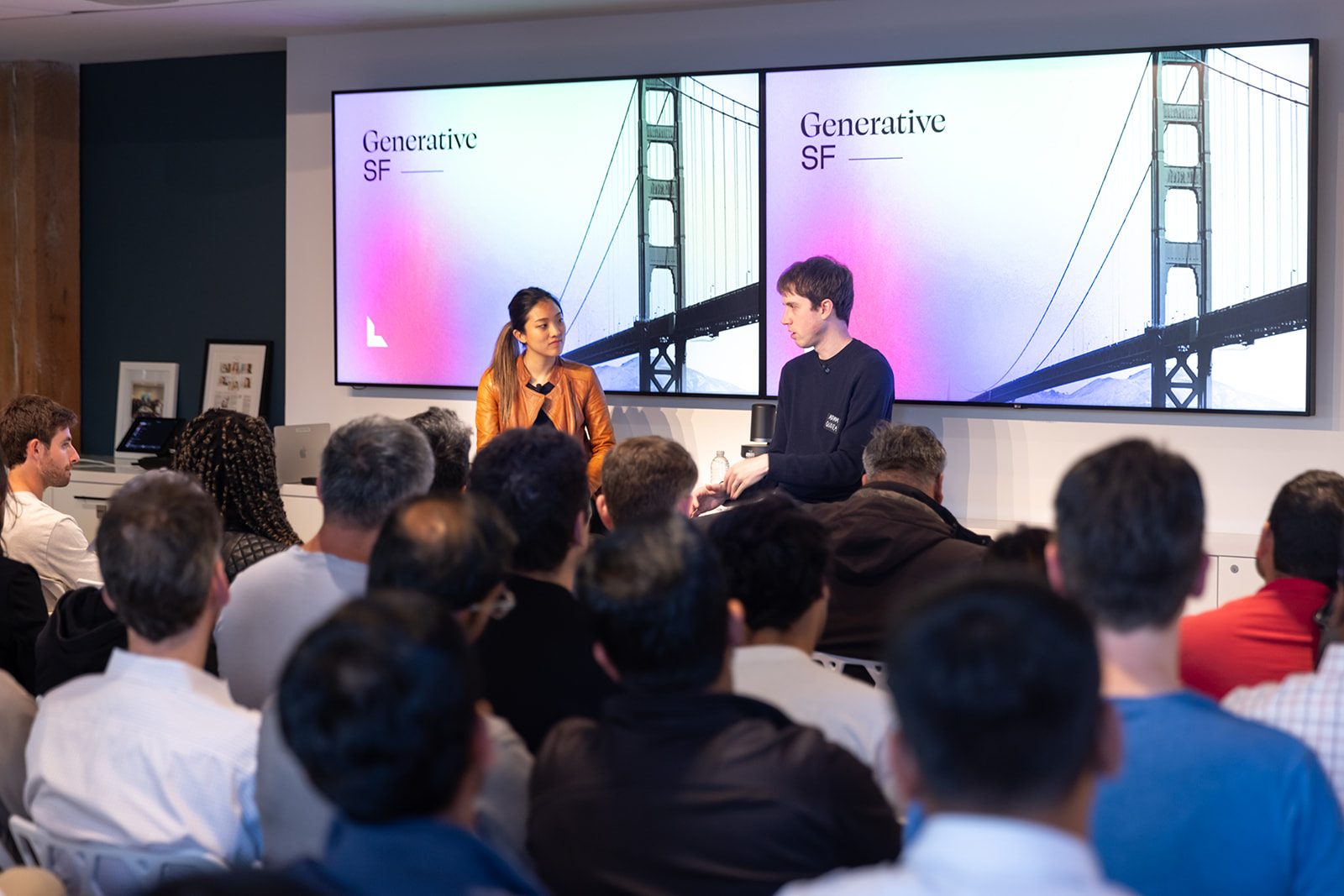06/18/2024
Highlights from #GenSF featuring Adam D’Angelo
We spoke with the CEO and Co-Founder of Quora about his new Poe chatbot platform and the future of the AI market.

In 2008, Adam D’Angelo left his job as Facebook CTO to co-found Quora, which rapidly became one of the most influential sources of information on the Internet. Each month, Quora serves up questions and answers across a diverse range of topics for more than 400 million users.
In December 2022 he launched a new AI platform from within Quora called Poe. This chatbot aggregator enables users to build their own bespoke chatbots based on nearly two dozen foundational large language models (LLMs). And as a board member of both OpenAI and Asana, Adam has a unique perspective on what it will take to succeed within the burgeoning generative AI economy.
Adam graciously agreed to take time from his hectic schedule to be the featured guest at one of our monthly Generative Live meetups in San Francisco and recently sat down with Lightspeed Enterprise Partner Lisa Han to talk about how Poe got its start, the value of experimentation and exploring different market opportunities, and where the AI market is headed.
Below are some highlights from the conversation (edited for clarity and brevity.)
How did Poe get its start?
About two years ago we could see the LLM wave coming and began experimenting by using GPT3 to generate answers to questions on Quora. We learned that the real strength of AI was not in substituting machine-generated answers for human ones, but the ability to instantly generate an answer to any question. It might be at a lower quality than you’d get from a human expert, but it would be valuable in cases where you couldn’t wait for an answer or afford to pay for one.
When we looked at the potential for this technology, we decided that the right form factor should be more like a private messaging app than of a social network or a platform like Quora. Now Poe serves as a recommendations engine for people to find the best models and the best apps built on those models.
What advantages did you gain by launching Poe from within Quora, instead of creating a new company?
The main advantage was speed to market. We actually started out by building Poe within Quora, until we realized it should be its own app. Then we experimented by taking 10 great engineers from Quora and assigning them to work on Poe, which turned out to be a huge advantage. I think if we had tried to recruit an equivalently good team for a new company, it might have taken a year or two, and then the opportunity would have been gone.
The other advantage was distribution. A significant percentage of Poe users found out about it because of Quora, and that was during a time of fierce competition in the AI aggregator space. There were a ton of products entering the market and we were able to pull ahead of them, partly because we’d invested more with better people, but partly because we had this distribution advantage. We might have been able to do something similar with a new company, but it would have been more difficult.
In the past you’ve said that the best consumer companies are built in tandem with a shift in technology. Can you elaborate on this?
A lot of times you look at a successful startup and ask, why didn’t anyone try anything like this earlier? And a lot of the time the answer is, it wasn’t technologically possible. YouTube is an example of a platform that wasn’t possible until broadband Internet adoption and the integration of Flash into web browsers. Social networking was the result of high Internet penetration among kids. Mobile phones made Instagram possible, and the GPS in those phones is what allowed Uber to be built. There are some exceptions to this, but in general you’ll have a much higher success rate if you’re doing something that’s newly become possible. Now LLMs will create new opportunities in the consumer market.
There seem to be two types of AI startups: AI research labs attempting to commercialize their work, and startups building apps off of that research. Which one matters more in today’s market?
I think there are opportunities for both. For example, if you’re creating an image-generation model with an API, it can be used as a building block by dozens of applications like games, image-editing, presentation software, and so on. You can build a very good business off an image-generating model. Right now, my bias would be toward the model companies, in part because it’s unclear what the right applications are going to be. If you build the right model, an entire ecosystem of applications can develop around it. If you focus on apps, you might have to invest in ten of them before you hit on one that actually works.
You’ve been on the board of OpenAI since 2018. What are some best practices you’ve seen there that others can adopt?
One thing that worked very well for OpenAI was placing a lot of bets and doubling down on the ones that worked. If you go back to when I joined the board, they had five different research streams going — fundamental research in robotics, algorithms, machine learning, and language modeling. And when the GPT paradigm took off they sort of focused the whole company on that. I think the lesson is that if you keep trying enough things, you’re more likely to get a hit.
Where do you see the AI market going forward? What’s been overhyped, and what hasn’t received enough attention?
The market is obviously optimistic about a certain category of AI companies, which are benefitting from fierce competition between investors and receiving super high valuations as a result. But I think there’s so much potential in AI that won’t be hard for these companies to become successful enough to turn those into very good investments over the long haul. The bad part of this is that the market seems to be ignoring everything else. No one wants to fund anything that isn’t AI. That’s irrational but understandable. If you’re an entrepreneur, you probably want to pay attention to those market signals.
Interested in attending a Generative Live event? Sign up here to receive notifications about future meetups, and be sure to listen to the Generative Now podcast, where AI builders talk about how they’re creating the future.
Authors



